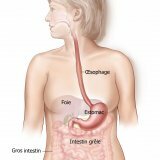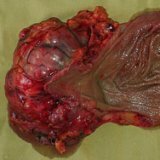Spasms in the stomach: causes and treatment
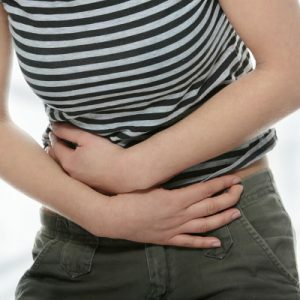
Severe pain of compressive nature, which is localized in the area of the upper half of the abdomen( left or center), in medicine is called a spasm in the stomach.This pathological condition is not a separate / independent disease, but is recognized as a symptom of many diseases that can be dangerous to human health and life.
Table of contents:Causes of gastric spasms
In medicine, the symptom in question is conditionally divided into organic and functional.
Organic form of gastric spasms
These can be evidence of the progression of acute and chronic diseases of the digestive system:
- gastritis;
- gastroduodenitis;
- erosive or ulcerative changes in the mucous membrane of the stomach and / or duodenum.
Note: is often an intestinal and pancreatic colic by the patient himself is perceived as a gastric spasm.
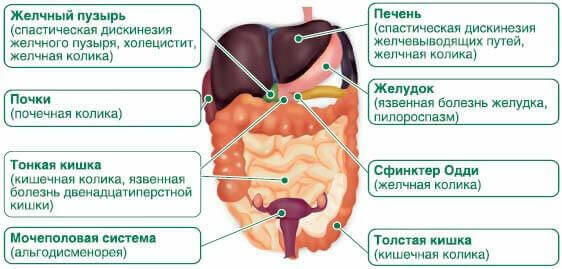
Functional stomach spasms
This type of symptom in question develops against the background of the absence of the above pathologies of the digestive system. In this case, doctors identify the following causes of stomach cramps:
- use of certain medications;
- frequent stress and neurosis;
- vegetative-vascular dystonia( there are so-called nerve pains in the stomach);
- is allergic to certain specific foods;
- improper / inefficient power supply;
- food poisoning;
- consuming coffee and strong tea in large quantities;
- subcooling.
The manifestations of stomach spasms
B olive characterize the symptom in question as follows:
- "under the spoon" dull pain;
- if you take a bent position, it becomes much easier;
- there are desires for vomiting.
Spasm diffusion
Gastric spasms are characteristic of the following pathological conditions:
- Acute appendicitis.Initially, the pathology of pain is localized specifically in the epigastric region, a little later it moves to the right side of the abdomen( rarely - to the left), there may be vomiting no more than 2 times in a row, the patient's general condition is disrupted.
- Acute gastritis.Most often in this case, the spasm in the stomach develops after eating spicy foods, acids or alkalis( this can happen by accident).Gastric spasm in the face of acute gastritis is always accompanied by nausea and vomiting, which do not bring relief.
- Intestinal colic.In addition to severe pain in the anatomical location of the stomach, the patient has a urge to defecate, after which it becomes much easier.The general state of the person with such spasms in the stomach does not suffer, he remains active.
- Irritable bowel syndrome.Gastric spasm in this case will be mild, the patient feels within normal limits, but his stool is mucous, there is a constant swelling of the abdomen.
- Nonspecific ulcerative colitis.This symptom will be located more at the bottom of the abdomen, necessarily accompanied by a urge to defecate, and in the chair the patient himself discovers mucus and blood.
Gastric spasm is also characteristic of biliary colic, which develops after consuming fatty or fried foods. Spasms in this case will be localized in the right hypochondrium, accompanied by bitterness in the mouth, belching, vomiting, the body temperature may slightly increase( to subfebrile temperatures).
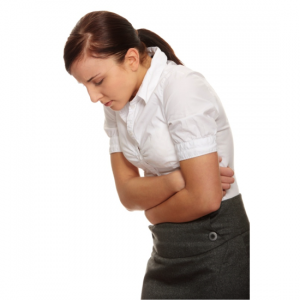 If there is too intense spasm in the stomach, then this may indicate the development of acute pancreatitis or pancreatic colic that occurs after eating spicy foods or alcoholic drinks .In this case, the pain is very strong, can radiate into the back or shoulder blade, accompanied by vomiting and nausea.If the spasm in the stomach is associated with the development of acute pancreatitis, then you need to measure the temperature of the body - its increase is a characteristic symptom for this pathological condition, but with pancreatic colic, body temperature remains within normal limits.
If there is too intense spasm in the stomach, then this may indicate the development of acute pancreatitis or pancreatic colic that occurs after eating spicy foods or alcoholic drinks .In this case, the pain is very strong, can radiate into the back or shoulder blade, accompanied by vomiting and nausea.If the spasm in the stomach is associated with the development of acute pancreatitis, then you need to measure the temperature of the body - its increase is a characteristic symptom for this pathological condition, but with pancreatic colic, body temperature remains within normal limits.
If a spasm in the stomach appears immediately after eating, this will be a characteristic sign of stomach ulcer .Such spasms are very painful, they pass by themselves at a certain time and do not depend on the act of defecation.
Spasms in the stomach can be combined with diarrhea, and in this case it may indicate:
- irritable bowel syndrome;
- intestinal infection or poisoning( the feces become mucous with greens and / or blood streaks);
- acute pancreatitis.
Note: spasm in the stomach can occur and on the nerves, which develops after the transferred stress, some exciting or unpleasant event.Of course, the symptom under consideration on a nervous basis only appears in extremely hypochondriac and emotional people.Such an attack on the nerves can last several hours, while the person completely disappears .
Spasm in the stomach in pregnant women
This symptom in the period of bearing a child in a woman in general is not uncommon. The causes of gastric spasm in this category of patients will be :
- Pressure on the stomach grown uterus.This is the case in the last months of pregnancy, a spasm in the stomach will be accompanied by heartburn and always occur after eating.
- Increased progesterone level.For this reason, spasms in the stomach can appear only at the very beginning of pregnancy, when the hormonal system is only tuned for hard work.Progesterone, produced at the beginning of pregnancy in large quantities, affects not only the uterus, but also the mucosa of the stomach, which provokes the appearance of the symptom in question.
- Toxicosis in early pregnancy.In this case, a spasm in the stomach will always be associated with food intake, or be a reaction to the forced starvation of a future mum - pregnant women with toxicosis consciously refuse to eat to avoid nausea and vomiting.
Note: spasms in the stomach should not be confused with contraction of the uterine muscles, which provoke the appearance of pains in the lower abdomen.Such spasms are a sign of miscarriage or premature birth, which requires immediate medical attention.
During pregnancy, a woman can develop all those dangerous conditions described above - gastritis, intestinal colic, ulcerative changes in the gastric mucosa / duodenum and so on.
Causes of spasms in the stomach in the child
If the symptom in question is present in a child under the age of one year, then it can indicate the following pathological conditions:
- Lack of enzyme lactase.It is in the intestines and takes an active part in the splitting of milk and unadapted milk mixtures.Parents can pay attention not only to the strong crying and anxiety of the baby, but also to bloating, loose stools, poor body weight gain.
- Dysbacteriosis.This pathology develops after the child or nursing mother receives antibacterial drugs( antibiotics).For this condition, spasms in the stomach, bloating, variability of the stool( from diarrhea to constipation), presence of mucus and / or blood in the feces will be characteristic.
- Pylorospasm or pyloric stenosis.This disease develops in babies at the age of one and a half to three months, characteristic for it will be vomiting, regurgitation, signs of dehydration, as food and liquid either do not enter the intestine at all, or come in too small amounts.
http: //zacep.com/ wp-content /uploads/2015/10/ koliki-u-novorozdennyh.jpg
Note: if a spasm in the stomach disturbs a child under the age of one year, then he will cry and scream, press his legs to his stomach, to calm him quickly is unlikely to succeed.
Children of older age may experience gastric spasm under the same pathological conditions as adults( they are indicated above), and against helminthic invasion.
How is the diagnosis of diseases that are accompanied by a gastric spasm
Doctors insist that when there is a spasm in the stomach, a person should seek qualified medical help.Only a specialist in polyclinic conditions will be able to establish the true cause of the condition in question. And within the framework of diagnostics can be carried out:
- general blood test;
- ultrasound examination of abdominal organs;
- coprogram;
- bacteriological study of feces;
- gastroduodenoscopy.
Treatment of spasms in the stomach
So, a person has a spasm in the stomach, the pain in this case is always quite intense and compelling to take some measures to ease the condition.What do most patients do?That's right - they are trying to find a solution to the problem on the Internet. Remember!In no case should you use any advice, much less pay attention to the wonders of folk medicine if a stomach spasm is accompanied by at least one of the following symptoms:
-
 dizziness and weakness;
dizziness and weakness; - diarrhea with blood;
- blood in urine or severe darkening of urine;Jaundice of skin and eye proteins;
- ;
- vomiting, especially if it has a brown color or contains blood;
- semi-faint;
- a strong increase in heart rate;
- bleeding from the vagina;
- pain occurred after taking hormonal or anesthetic medicines.
In most cases, specialists recommend that you seek qualified medical attention immediately after the onset of the symptom in question. But there are cases where such treatment can be postponed for 1-2 days without detriment to health:
- The pain appeared after a lot of stress, some powerful emotional outbursts.If the spasm in the stomach disappeared after a few hours, the pain does not resume, and the general state of the person remains unchanged.
- If the spasm in the stomach is a consequence of a violation of the diet, and after the normalization of nutrition the condition is fully restored.
- The pain was short-lived, not accompanied by vomiting or general disturbance of well-being.
If no dangerous symptoms have been identified with a spasm in the stomach, then the following algorithm can be used to facilitate the condition:
- Calculate the pulse( should be 100 beats per minute at the peak of the attack of pain), measure blood pressureShould not be above 140/90 and not below 100/60), measure body temperature( should not be above 37, 3 degrees).If there are any deviations from these indicators, you should immediately call a doctor.
- If all the indices are normal, the patient should take a supine position and apply a warm water bottle to the stomach.
- It is allowed to take an antispasmodic tablet or use rectal suppositories with a similar therapeutic effect.But such medications are allowed only in the case of normal blood pressure indicators.
- If a patient has already been diagnosed with gastritis and the doctor has already prescribed treatment, then the drug can be taken from this list.
Please note: should never be used to cleanse the intestines and take any painkillers.
If the patient does not have allergies to herbs and plants, there are no diseases of the cardiovascular system, kidneys and liver, then it is possible to ease the condition with gastric spasm in folk remedies:
- 2 teaspoons of dried and crushed mint leaves to pour a glass of boiling water, 30 minutes to insist.Then the infusion is diluted with water in a proportion of 1: 1 and drunk during the day in small portions;
- mix nettle, St. John's wort and tavolg in the amount of 2 tablespoons and pour 1, 5 liters of boiling water.Infused for 60 minutes, then filtered and used immediately in an amount of 200-250 ml.The rest of the infusion should be drunk within a day for several meals.
After the spasm in the stomach disappears, doctors recommend some time to adhere to the diet - this will reduce the burden on the stomach, it will calmly recover and begin to work in normal mode.The diet implies the exclusion of alcoholic beverages, fried / smoked / spicy / acidic / pickled dishes.
Spasm in the stomach is a symptom that can indicate both dangerous pathologies and minor health disorders.In any case, in order to prevent the development of complications, it is necessary to pass a survey and get advice from a gastroenterologist.
Konev Alexander, therapist

